French President Emmanuel Macron has named Michel Barnier, the former European Union Brexit negotiator, as France’s new Prime Minister.
The move comes after months of political stalemate following a snap election that weakened Macron’s centrist camp and saw other forces on the right and left fall short of an outright majority.
The Élysée Palace announced Barnier’s appointment on Thursday, stating that the 73-year-old veteran politician from the conservative Les Républicains (LR) party had been “tasked with forming a unifying government to serve the country and the French.”
Choosing Barnier: A strategic move to command majority support
Despite coming from a rival centre-right party, Barnier’s appointment signals Macron’s efforts to bridge the political divide by selecting a figure with significant standing on the European stage.
Barnier’s previous roles, including his time as France’s EU commissioner overseeing financial services and as the chief negotiator during Brexit, have earned him international recognition.
Macron hopes that Barnier’s cross-party appeal will help secure the support needed to pass crucial legislation, particularly as the government faces a hung parliament.
Barnier now faces the challenge of forming a cabinet that can navigate the complex political landscape.
While his appointment does not require parliamentary approval, opposition parties in the National Assembly can still table no-confidence motions, potentially destabilizing his government.
The prime minister’s ability to gather cross-party support will be essential. As political analysts have pointed out, Macron has not entirely resolved the crisis, and Barnier’s legislative moves may trigger opposition from various factions within the divided assembly.
Navigating a hung parliament: A delicate balance
Macron’s centrist alliance suffered significant losses in the snap election, leaving the political landscape fragmented.
While a left-wing alliance, led by Jean-Luc Mélenchon’s France Unbowed party, won the largest number of seats, they were still short of an outright majority.
Macron’s centrist bloc came second, while Marine Le Pen’s far-right Rassemblement National (RN) emerged as the third-largest force, making it the largest single political party.
The hung parliament means that Barnier’s government will require broad support to pass any legislation.
In a political environment where left-wing and far-right parties are positioned against each other, Barnier will have to balance competing interests carefully.
His appointment represents a rightward tilt in Macron’s administration, which has already drawn criticism from left-wing groups.
Mélenchon quickly condemned the decision, accusing Macron of appointing a prime minister from a party with a smaller electoral mandate.
“We have a member of the party that registered the smallest score,” Mélenchon told reporters, voicing his dissatisfaction with Barnier’s nomination.
On the other hand, Le Pen cautiously welcomed Barnier’s appointment, stating that he met one of RN’s key demands: a leader willing to engage with all political forces.
“Compromises will be needed to solve the budget situation,” Le Pen remarked, reflecting on the difficulties of managing France’s public finances amid the political deadlock.
Barnier’s mission to address budget concerns
One of the pressing tasks for the new prime minister will be addressing the economic challenges that France faces, particularly as the 2025 budget discussions loom.
With France’s public finances under strain, finding a solution to the country’s budgetary issues will require significant political maneuvering.
Barnier’s international reputation and experience in various French cabinet roles, including foreign minister, make him a credible figure to reassure markets and stakeholders.
Mujtaba Rahman, an analyst at Eurasia Group, highlighted Barnier’s appeal to market participants and European leaders, stating,
He’s a safe pair of hands known to market participants, known to Europe, and the domestic political elite within France.
European Commission president Ursula von der Leyen also offered her congratulations, noting that Barnier’s long experience would be valuable in his new role.
“I know that Michel Barnier has the interests of Europe and France at heart,” she said in a message on social media platform X.
Balancing internal and external expectations
Barnier’s appointment follows a turbulent period in French politics, marked by Macron’s decision to call the snap election—a move that many within his own camp criticised.
The previous prime minister, Gabriel Attal, was removed after just 10 months in office.
Attal, a former Macron ally, became France’s youngest-ever prime minister at the age of 34, but relations between him and the president soured after the election.
For Barnier, the nomination crowns a long and distinguished career. In addition to his role as the EU’s Brexit negotiator, Barnier previously competed to be the LR presidential candidate in 2022 but lost to Valérie Pécresse.
His stance on immigration during that campaign, which included a call for a moratorium on non-EU arrivals, positioned him as a hardliner and could make him more palatable to the far right, including Le Pen’s RN party.
Despite this, Barnier remains a well-respected figure across political and economic spheres.
However, his ability to navigate the complex political landscape, particularly with a hung parliament, remains to be seen.
Whether he can deliver on urgent legislative matters, including the 2025 budget, will depend largely on his ability to secure the support of both the left and right, as well as Macron’s continued backing.
As Macron seeks to break the political deadlock, Barnier’s appointment marks a significant step in resolving the crisis, but the future of his government remains uncertain.
As parliament reconvenes and budget discussions begin, all eyes will be on Barnier and his efforts to steer France through this critical period.
The post Michel Barnier named French PM as Macron seeks to resolve political impasse appeared first on Invezz

